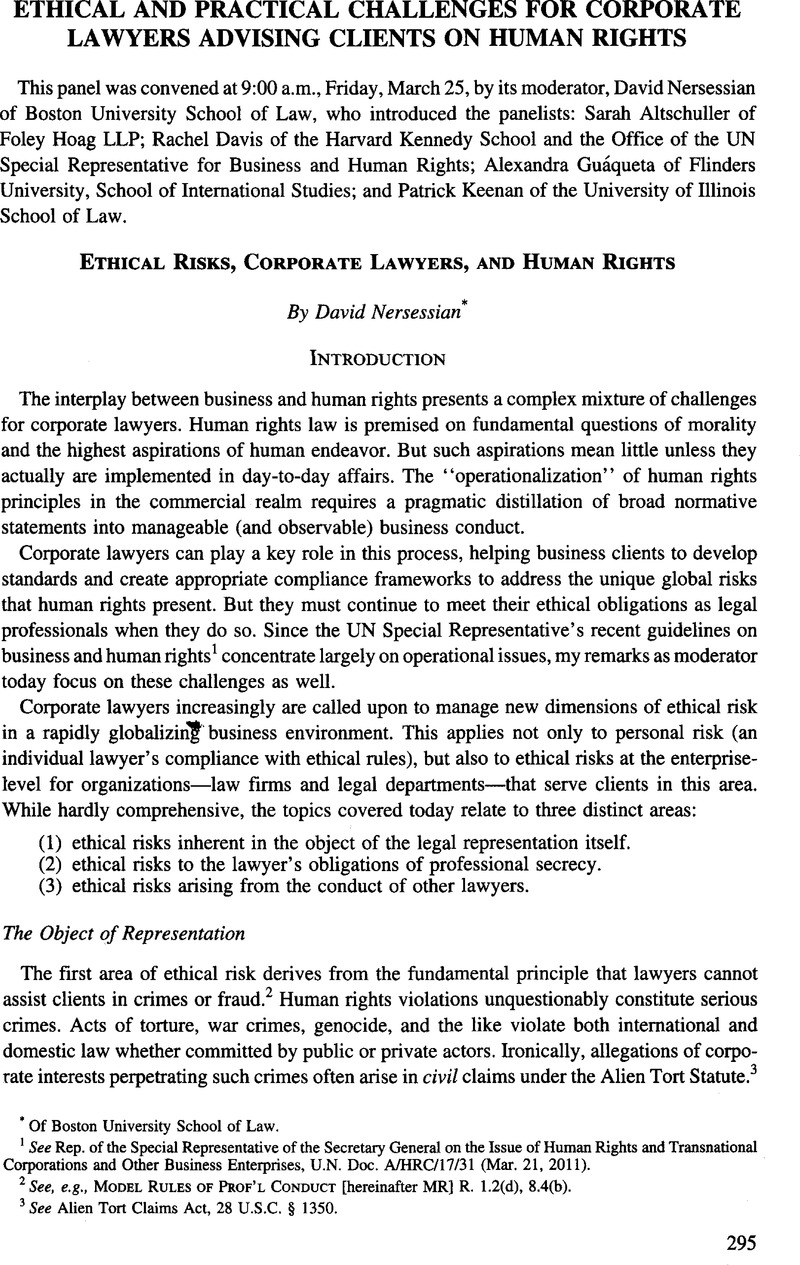No CrossRef data available.
Published online by Cambridge University Press: 28 February 2017

1 See Rep. of the Special Representative of the Secretary General on the Issue of Human Rights and Transnational Corporations and Other Business Enterprises, U.N. Doc. A/HRC/17/31 (Mar. 21, 2011).
2 See, e.g., Model Rules of Prof’l Conduct [hereinafter Mr] R. 1.2(d), 8.4(b).
3 See Alien Tort Claims Act, 28 U.S.C. § 1350.
4 See Prosecutor v. Alstötter (Case No. 3), 3 Trials of War Criminals 1 (U.S. Mil. Trib. 1949) (German judges and prosecutors); Prosecutor v. von Weizsaecker (Case No. 11), 14 Trials of War Criminals 1 (U.S. Mil. Trib. 1949) (lawyers in German ministries).
5 See Prosecutor v. Krauch (Case No. 6), 7 Trials of War Criminals 1 (U.S. Mil. Trib. 1948), Prosecutor v. Krupp (Case No. 10), 9 Trials of War Criminals 1 (U.S. Mil. Trib. 1948); Prosecutor v. Flick (Case No. 5), 6 Trials of War Criminals 3 (U.S. Mil. Trib. 1947) (cases against German industrialists).
6 See, e.g., Prosecutor v. Van Anraat, Judgment, The Hague Court of Appeal (Neth.), Case No. LJN-BA4676 (May 9, 2007) (finding corporate executive who supplied chemical weapons materials to Saddam Hussein guilty of complicity in violations of the laws and customs of war).
7 See Mr 8.4(b).
8 See Mr 1.16(a)(1) (prohibiting representation that requires a lawyer to violate ethical rules or other laws). Other rales allow permissive withdrawal. See, e.g., Mr 1.16(b)(2), 1.16(b)(3) (client crimes involving the lawyer’s services); Mr 1.16(b)(4) (conduct that the lawyer finds repugnant or with which counsel has a fundamental disagreement); Mr 1.16(b)(7) (other good cause).
9 See, e.g., Upjohn Co. v. United States, 449 U.S. 383 (1981)Google Scholar (corporate attorney-client privilege). Not all nations recognize the corporate privilege to the same extent, however. See, e.g., Case No. C-550/07-P, Akzo Nobel Chems. Ltd. v. United Kingdom, Judgment of Sept. 14, 2010 (E.C.J. 2010) (professional secrets privilege does not apply to in-house lawyers). Obviously, this disparity presents significant concerns if foreign law governs professional secrecy in a particular corporate matter. See, e.g., Mr 8.5 cmt. 7 (including “transnational practice” in choice of law analysis).
10 See, e.g., Fed. R. Civ. P. 26(b)(3) (heightened protection for attorney’s mental impressions and opinion work product).
11 See, e.g., Mr 1.6(a) (broad protection covering “information relating to the representation of a client”).
12 See Mr 3.3(a)(3), 3.3(b).
13 See Mr 4.1(b) (requiring disclosure unless information remains protected under Mr 1.6).
14 See, e.g., Clark v. United States, 289 U.S. 1,15 (1933) (crime/fraud exception to the attorney-client privilege).
15 Mr 1.6(b)(1).
16 See, e.g., Doe I v. Unocal Corp., 395 F.3d 932 (9th Cir. 2002) (allegations of murder, forced labor, rape, and torture committed against Burmese villagers during the construction of a gas pipeline in Burma). This opinion was vacated in 2003, but the case settled prior to the scheduled rehearing en banc. See Doe I v. Unocal Corp., 403 F.3d 708 (9th Cir. 2005).
17 Mr 1.6 cmt. 6.
18 See, e.g., Cal. Bus. & Prof. Code § 6068(e).
19 See, e.g., Fla. R. Prof’l Conduct 4-1.6(b)(2).
20 See Mr 1.13(a).
21 See Mr 1.13(b). Lawyers must “report up” all the way to the board of directors, if circumstances require. See Mr 1.13 cmt. 5.
22 See Mr 1.13(c). Lawyers for publicly traded companies have additional reporting obligations. See Sarbanes- Oxley Act of 2002, 15 U.S.C § 7245.
23 See Mr 5.1(a) (measures to ensure that other lawyers comply with ethical obligations); Mr 5.3(a) (measures to ensure that non-lawyer conduct “is compatible with the professional obligations of the lawyer”).
24 See Mr 5.1(b) (supervision of junior lawyers); Mr 5.3(b) (supervision of non-lawyer personnel).
25 See Mr 8.3(a). There is an exception from reporting where the grounds for the report otherwise are confidential. See Mr 8.3(c).
26 See Mr 8.4(a).
27 See S.C. Res. 1970, paras. 9-21, U.N. Doc. S/RES/1970 (Feb. 26, 2011) (arms embargo, travel ban and asset freeze).
28 See Exec. Order No. 13566,76 Fed. Reg. 11,315 (Mar. 3, 2011) (prohibiting financial transactions with Libyan interests).